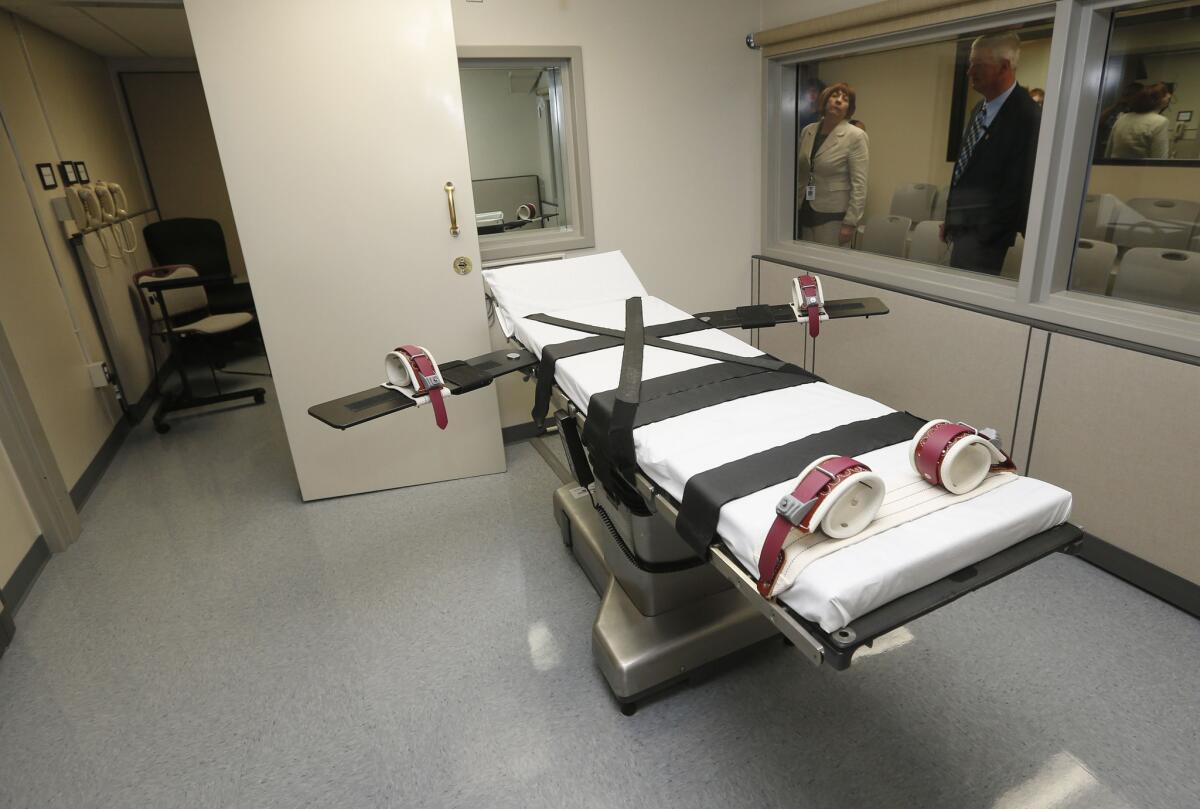Op-Ed: Why the execution drug shortage won’t go away

- Share via
In a few weeks, the U.S. Supreme Court will hear Glossip vs. Gross, which examines the use of the drug midazolam in lethal injection executions. The case comes on the heels of an infamously gruesome 2014, a year that saw botched executions in Ohio, Oklahoma and Arizona.
The states’ problems stem from their increasing difficulty obtaining effective, reliable, FDA-approved drugs to use in lethal injections. The reason is simple: Drug companies don’t want their products used to kill people.
But that’s not what we’re told by state officials. They claim the shortage is strictly the result of anti-death penalty activists harassing the drug companies into abandoning the use of their products in executions. Last year in Ohio, for example, new state laws were drafted to shield the identities of suppliers of lethal injection drugs. State officials maintain that if they can just keep information about the drugs secret, they can ensure a steady supply of approved drugs.
It’s true that drug companies have heard from anti-death penalty advocates, but those same companies — and their shareholders and customers — have long objected to the use of their products in executions, as a reflection of both their values and a concern for their bottom line.
The widespread recent issues with obtaining reliable lethal injection drugs began when the U.S. pharmaceutical company Hospira stopped manufacturing FDA-regulated thiopental in 2010 because of a production problem at one of its plants. At the time, thiopental was the anesthetic widely approved by states as part of their three-drug protocol for executions.
In March of that year, Hospira had requested that prison officials in multiple states discontinue the use of thiopental in executions. “Hospira provides these products because they improve or save lives and markets them solely for use as indicated on the product labeling,” the company wrote. “As such, we do not support the use of any of our products in capital punishment procedures.”
When Hospira discontinued thiopental, some states began to quietly buy unregulated, non-FDA approved thiopental from a wholesaler in London. In 2010, Britain responded by implementing an export control on thiopental; this control was later adopted more generally by the European Union, none of whose members practice capital punishment. Eventually, a federal appeals court in Washington shut down importation of unapproved thiopental altogether.
This has caused state officials to change their protocols, experimenting with whatever anesthetics and sedatives they were able to obtain at a given moment. (Midazolam, which isn’t specified for use as an anesthetic, is one of the alternates that states have tried, ushering in the Supreme Court case.) At every turn, as protocols have changed — and even before thiopental became unavailable — drug companies have tried to figure out how to prevent their products from being used in American executions.
As early as 2001, pharmaceutical companies such as Abbott Laboratories and Baxter International publicly condemned the use of their products in capital punishment. At the time, they were unable to develop distribution controls to prevent prisons from using the drugs.
In January 2011, the president of the Danish pharmaceutical manufacturer Lundbeck wrote to the top prison official of Ohio: “We urge you to discontinue the use of Nembutal [another anesthetic alternative] in the execution of prisoners in your state because it contradicts everything we are in business to do — provide therapies that improve peoples lives.”
Such statements show that corporate leaders are convinced that using their medical products to induce death does not comport with the mission or financial interests of their companies. As the investment firm DJE Kapital stated in 2014 when it divested $70 million from Mylan, which produces the paralytic agent used in some lethal injection executions, “If clients find out we have shares in companies that supply that drug, we have problems with our clients.”
Shrouding the execution process in secrecy may keep problematic executions out of the public eye, but it will not increase the availability of drugs for use in executions. There is no indication that drug companies are looking to get around the export and import barriers that have been erected. Instead, the problem facing states is more fundamental: They are seeking to impose the death penalty despite a global economic context in which much of the rest of the modern world abhors the practice. As long as that is the case, they are going to have problems finding pharmaceutical products to carry out executions.
Ty Alper is a clinical professor of law at UC Berkeley and author of “The United States Execution Drug Shortage: A Consequence of Our Values,” published in the biannual Brown Journal of World Affairs.
Follow the Opinion section on Twitter @latimesopinion and Facebook
More to Read
Sign up for Essential California
The most important California stories and recommendations in your inbox every morning.
You may occasionally receive promotional content from the Los Angeles Times.













